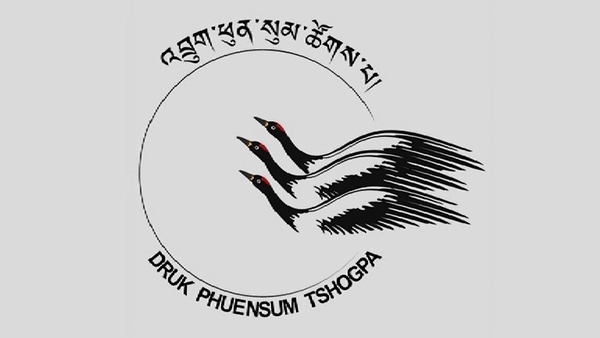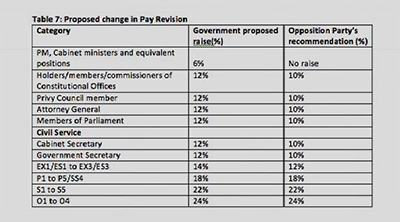 The opposition says the government’s pay revision proposal risks widening the gap further. According to the press release, the opposition highlighted seven risks they observed with the government’s recommendations on the pay revision.
The opposition says the government’s pay revision proposal risks widening the gap further. According to the press release, the opposition highlighted seven risks they observed with the government’s recommendations on the pay revision.
The opposition party, Druk Phuensum Tshogpa (DPT) says while the pay raise is negligible, it proliferates allowance system, poses high financial risks, aggravates imprudent expenditure and stunts economic growth and risks morale loss and higher corruption in public service.
 The government has proposed a pay raise between 6-35%, with a higher percentage to the lower rung. The opposition says this accounts from the highest raise in absolute terms to Prime Minister at Nu 10,800 to the lowest to ESP at Nu 1,463.
The government has proposed a pay raise between 6-35%, with a higher percentage to the lower rung. The opposition says this accounts from the highest raise in absolute terms to Prime Minister at Nu 10,800 to the lowest to ESP at Nu 1,463.
The Pay Commission, however, affirmed the erosion of income by 20.9% due to inflation since the last raise in 2014 to 2019. The press release states, “factoring in the erosion, pay raise in the most categories even do not compensate the erosion while some lower categories gain marginally but very dismal.”
The opposition says, “the highest raise was made during the First Parliament by 40-77%, followed by the Second Parliament by 20-40%. The currently proposed raise of 6-35% by the Third Parliament in terms of upfront pay raise is the lowest so far.”
The current pay revision proposals will further widen the gap, the opposition says. “While the raise is higher for lower categories and lower for higher categories in terms of percentage, in terms of absolute amount the raise is higher at higher categories and vice versa.”It says Prime Minister receives the highest raise of Nu 10,800 while O4 receives the lowest raise of Nu 2,045.
The opposition’s analysis of the incremental difference between two immediate levels of public servants also showed a clear trend of higher raise at higher levels. “The difference rises sharply disproportionately between constitutional heads and Cabinet Members, at Nu 53,620 between constitutional head and Ministers and Nu 106,620 between constitutional heads and Prime Minister.”
Also, the analysis of the trend of pay raise between the lowest and highest public servants show sudden widening of pay gap after pay raise in 2014 and the trend continues, albeit some improvement, in the current proposal. “Compression ratio has increased from 16 in 2009 to 26 in 2014 and will remain at 20 with the present raise.”
The party says it will aggravate inequity in the public service as well as society at large.
It also states the current pay revision proposal is less of a pay raise and more of allowance proliferation proposal. “But the current proposal opens a Pandora’s Box for all sorts of allowances. In the process, it omits allowances for various groups, jobs and positions with the same or even higher degree of difficulty, risks and importance such as in immigration, customs, forestry, judiciary, law and order, roads, engineering, architects, teaching, health, veterinary, parliamentary services and a host of other groups and professions.”It says the Contract employees are disadvantaged even further. It will be extremely difficult to contain the further proliferation of allowances in future.
The opposition further states the pay revision proposal comes with huge financial risks to the State, “the total financial implications of the Fourth Pay Commission’s Pay Revision proposal was Nu 4.238bn annually, which is now increased to Nu 4.530bn upon revision of the proposal by the government.” “However, this still excludes capitation fees, subsidies, stipends and transfers, which will also be drawn from the Consolidated Fund for salaries, allowances and other emoluments for other public servants. For the Royal University of Bhutan alone, an additional amount is estimated at around Nu 208 M. Therefore, the actual financial implications in five years is expected much higher by additional around Nu 2bn,” says opposition.
It says the government solely relies on revenue from Mangdechu Hydropower and there was no plan to generate revenue from additional taxes or other forms. “ This puts huge risks to national public finance stability.”
The Pay Revision is estimated to cost additional Nu 4.530bn, the opposition says it will substantially increase the share of recurrent expenditure and conversely, decrease the share of capital expenditure. They said the recurrent expenditure as a share of total national outlay has been soaring in comparison to capital expenditure.
“This is a clear signal of an imprudent, inefficient and unsustainable public finance expenditure policy. This will further curtail investment, growth and job creation in the economy,” opposition says.
The investment trend shows volatility both in government and private investments. They said the government investment has in fact dropped by 9.5% in 2017-18 and is expected to drop further by 25.7% in 2018-19. “Therefore, the Pay Revision puts public expenditure system and the economy at high risk of stunting and jobless economy.”
The opposition also says, “the given the way the present Pay Revision proposal is structured, such as minimal upfront raise, widening of gap, inducing more inequity and host of other factors that could be induced across the public service by the present proposal, we could foresee a high risks of loss of morale in public service on the whole. This could inevitably lead to more corruption as well.”
 Recommendations
Recommendations
Therefore, the opposition recommends the Government to revisit and review all the pay and allowances, including those of MPs and equivalent positions and improve the Pay Revision proposal.
Their recommendations include no raise for the prime minister, cabinet ministers and equivalent positions while further reducing the raise for higher categories by two percentages. They say the main reason for proposing no raise to PM and Ministers is owing to their pay having gone disproportionately high compared to immediate lower brackets, after the raise in 2014.
“We have also noted that the Government’s current proposal deviates substantially from the Pay Commission’s proposal, which brings a serious question of professionalism, objectivity and credibility of the Report apart from the respect for core mandate and purpose of the Pay Commission.”








